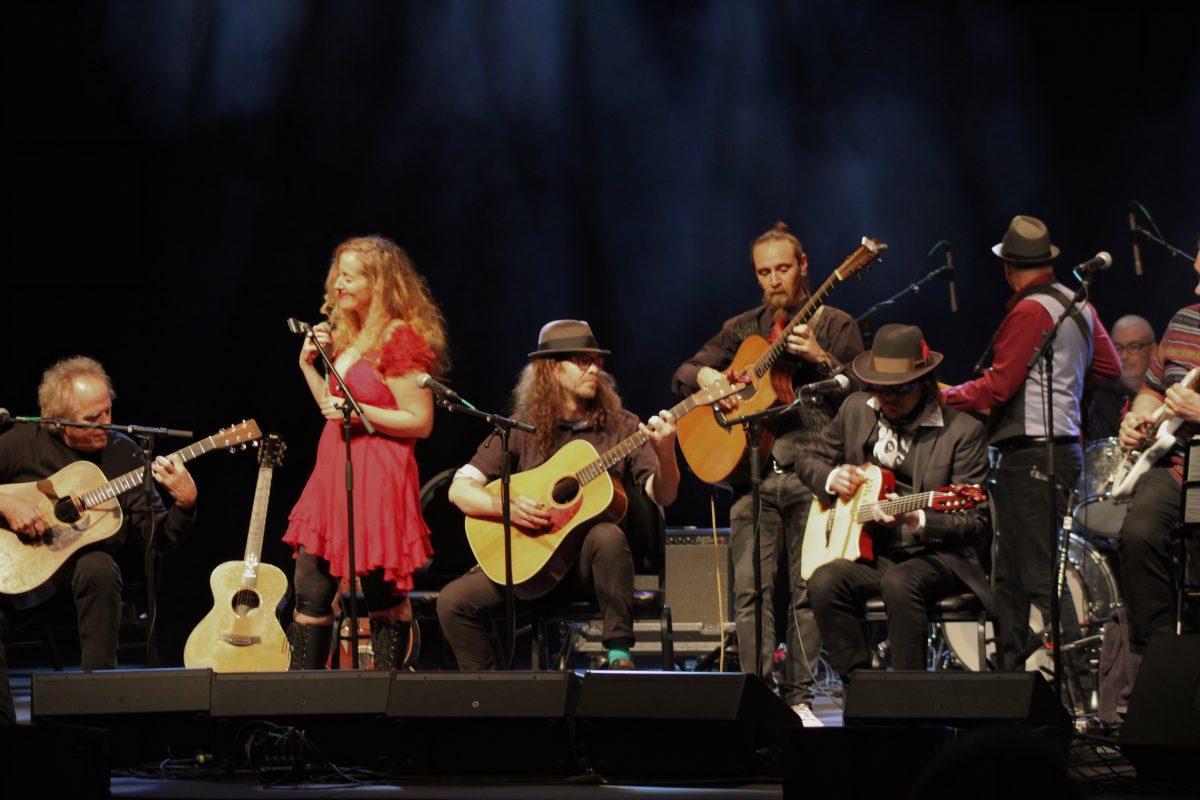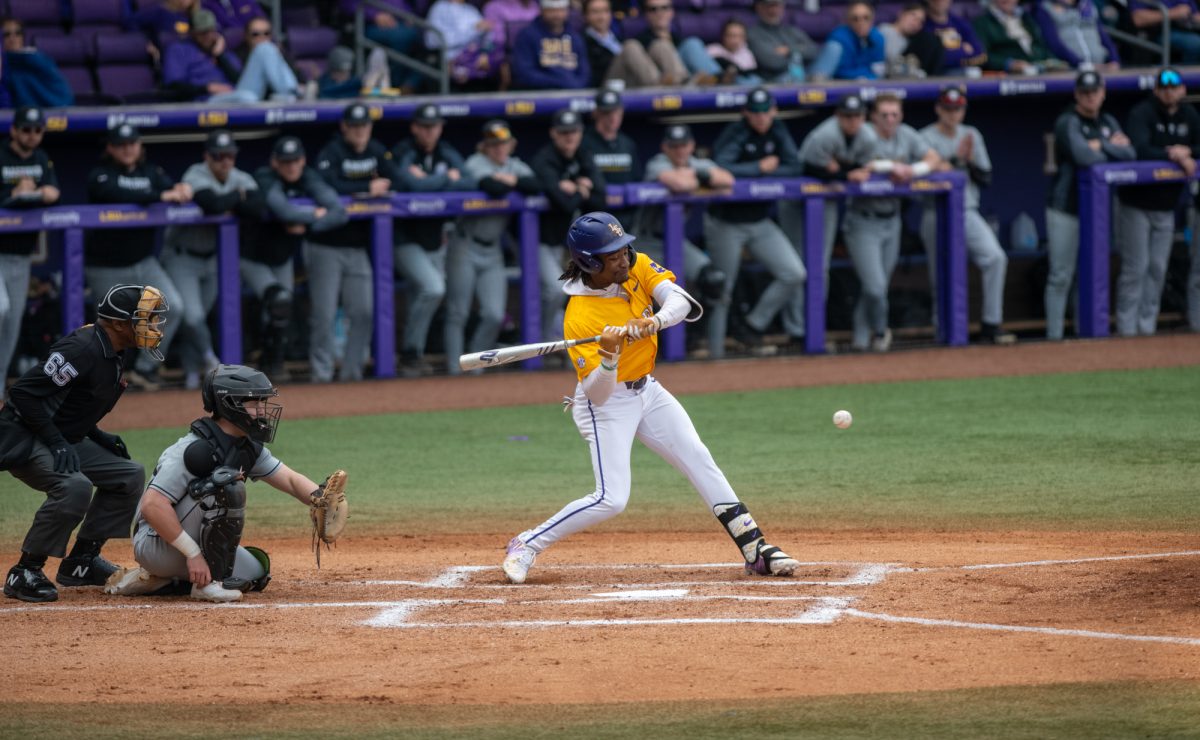On the night of October 16th at the Manship Theatre, guitar virtuoso Jimmy Robinson hosted the 6th annual Across The Pond Guitar Festival with performers Gavino Loche, Adrian Roso, Layla Musselwhite, and the New Orleans Guitar Masters. With over four decades of experience, Robinson has crafted tracks with a style that borrows from blues, progressive rock and jazz fusion. His early work as a member of instrumental fusion rock group, Woodenhead, and progressive rock group, Laugh in the Dark, molded him into a expert guitarist with a rapid, flashy playing style that enhances the progressive melodies to create fantastical results, transporting listeners to the naturalistic scenes that his songs and titles allude to.
Two days prior to the night of the performance, I had the privilege of hosting an interview with Robinson in which he detailed his musical process as well as which elements of songwriting take precedence when he composes a track. The interview also elaborated on his relations and first encounters with the collective of musicians he brought together for the performance, with each of them having ventured into other projects,providing styles that complimented the progressive, folksier elements of Robinson’s music.
The theater was modestly filled with patrons who had a keen interest in the brand of bluesy acoustic work that Robinson specializes in, as well those of the collaborators he invited along for the event. Once everyone was seated, Robinson was introduced and sat himself down and armed himself with nothing but an acoustic guitar, ready to amaze the audience with a night of guitar wizardry. The first song he played was a track that Robinson had played in the last four minutes of our interview, and it was just as engaging to hear in the theater as it was one on one. The way his fingers effortlessly glide on the strings, finding their mark amidst various notes without missing a beat is only matched by his technical abilities in producing other sounds from his guitar. The lightning quick strumming compliments the gently plucked harmonics in a manner that makes the track feel like an introduction to a fantastical new world, aided of course by Robinson’s progressive rock songwriting inclinations.
Once Robinson’s set had concluded, blues musician Layla Musselwhite joined him on stage to present an entirely different, more traditional sound. The daughter of blues legend Charles Musselwhite, Layla has grown into a formidable musician who is at once a torchbearer for her father’s legacy, and a unique talent in her own right. Robinson and Musselwhite are no strangers to collaborating with one another as shown by the latter’s 2023 record American Primitive, which Robinson lent a hand in producing. The record is a product of a seasoned guitar virtuoso and a newly emerging blues talent coming together and paying homage to the decades of blues that preceded them, and their chemistry on stage perfectly reflects this energy found on the album.
Their set contained three songs in total, one of which coming off of American Primitive, and they all showcased Robinson’s versatility as a guitarist as well as Musselwhite’s smooth, harmonious vocal capabilities. Her stage presence harkened back to bluesy, folksy singers of old while remaining personal to her and just as captivating to audience members. Her and Robinson’s songs were among some of the more straightforward songs compositionally, yet they made for earnest and enjoyable performances as well. Soon after the pair’s time was up, Robinson called Gavino Loche and Adrian Raso to the stage.
Together, they performed a song that Robinson spontaneously and humorously titled “Gavino, Adrian and Me”, it stood out as a memorable highlight for me. The track returned to Robinson’s signature structure, but recurring riffs stood out thanks to the unique talents of all three performers and their seamless blending of playing styles. Robinson was as rapid as ever while Raso followed him, and Loche covered both guitar and percussion, creating a track that was as rewarding to listen to as it was to experience.
After this performance, Robinson and Raso left the stage to give room for Gavino Loche to flex his capabilities as a guitar virtuoso. Hailing from Italy, Loche has built a name for himself with his impressive performances that showcase his playful demeanor and capabilities as an artist. Along with his talents as a guitarist, he’s authored the book “Contemporary Fingerpicking Guitar” and worked as a journalist for “Chitarra Acustica”, the first Italian acoustic guitar magazine.
For such an accomplished musician, his attitude on stage was quite jovial and he was consistently interactive with audience members during his three song set. The set consisted of covers of Daft Punk’s “Get Lucky” and Deep Purple’s “Smoke on the Water” as well as a track I unfortunately didn’t recognize. Loche’s humor won over audience members before he had a chance to display his talent on the guitar, playing tunes with impressive proficiency all while providing his own percussion and adding his own bells and whistles to his playing style. With just himself and his instrument, Loche managed to perform covers that sounded as though they could have been recorded by two or three musicians together, placing him among the more impressive acts of the night.
With Loche’s set concluded, Robinson returned to the stage with longtime collaborators Cranston Clements and John Rankin to perform as the fabled New Orleans Guitar Masters. Having performed at venues as large as Jazzfest, the New Orleans Guitar Masters have been consistent in their commitment to performing for the local New Orleans area. Clements has had experience of over four decades, and was described by Robinson as a lifelong friend. Combined with Rankin, the group shifts from progressive acoustic tunes to blues, jazz, and even a bit of funk amongst other genres.
This variety in their genre labels shone through in the three songs they performed that night. The second and third songs were of particular interest to me, the former being a song from one of Clements’ old groups called “Funk It” and the latter coming from Robinson’s former group Woodenhead titled “Zeewa”. The trio interacted much how one would expect lifelong collaborators and friends to act on stage, and their chemistry was nothing short of spectacular. Each member contributed their own part to the larger sounds of the tracks, with Robinson and Rankin covering the melody while Clements added his own rocker flair to the mix with impressive electric soloing. For such a boastful title, the group was determined to live up to, and their acclaimed talents and made for a wonderful performance.
Following the trio’s set, guitarist Adrian Raso returned to the stage with three other members of his band on drums, bass, and rhythm acoustic guitar. Coming from Ontario, Canada, Raso’s take on French Gypsy music and swing was among one of the more unique sounds heard that night. Raso’s talents are so renowned that they’ve been called upon by directors to be used in film scores, most notably Sacha Baron Cohen’s Borat Subsequent Moviefilm and Konstantin Statskiy’s Hotel Belgrade. Heavily influenced by legends of gypsy swing such as Django Reinhardt, Raso’s recapturing of this style provides a swinging and lively sound that had the audience rising from their seats and moving along to the melody at the beckoning of Raso.
The three song set consisted of Raso’s song used in Borat Subsequent Moviefilm titled “Urn St. Tavern”, an original song titled “Once Upon A November”, and a cover of Django Reinhardt’s “Blue Drag”. All of these tracks kept the audience engaged and attentive to his infectious energy and invigorating talents as a composer and a performer. As a fan of Reinhardt’s material in high school, hearing Raso’s rendition of the masterful guitarist’s work evoked vivid memories for me and raised my excitement in a manner more personal than the performers before him. Out of all the performances, Raso’s was definitely the most crowd-pleasing of the night, at least until the next act.
It wasn’t long after Raso’s performance that all of the other guitarists came on stage for a show stopping performance. Musselwhite returned on vocals while all the other guitarists had their chance to show off their individual strengths with solos that transitioned smoothly from one performer to the next, culminating in the grandest showing of the night which was met with roaring applause from the audience as the performers all bowed in unison, faces brightly lit by the lights and their contagious smiles.
After a 15 minute intermission, they all reconvened to perform in more or less the same lineup with one or two songs each. Among some of the highlights was Robinson’s solo song “World of Trouble”, in which his rough vocal qualities added to the fast playing style and gritty nature of the song. Robinson was then accompanied by Musselwhite to perform “Winter Wheat”, another track off of American Primitive. Musselwhite’s vocals flowed as nicely as in her prior performances, with Robinson providing a complimentary playing style to her melodies. The last highlight was a performance featuring Robinson, Musselwhite, and Raso, which exuded a sensual, menacing energy matched by the red lighting hitting Musselwhite’s red attire and devious vocals.
I went into this interview and subsequent guitar festival knowing nothing of Jimmy Robinson or his collaborators and came out wanting to know more about this undeniably talented group. Each one of them have so much versatility in their playing styles and genre shifts, but, when combined, they are a formidable collective that expertly perform the various genres and compositions they provided that night. From progressive rock to blues to pop covers and gypsy swing, all musicians were engaging and exciting to audiences who were hungry for more. Out of the collection of artists, Robinson, Musselwhite, Raso and the New Orleans Guitar Masters stood out the most to me. Regardless, they left not a dull moment in earshot for the crowd, and their mastery of the guitar is something that inspires even the most unseasoned of beginners. To flash one’s skills as a musician is one thing, but to encourage other aspiring musicians and bring out the best in other artists is something entirely different in the best way.
Listen to the interview with Jimmy Robinson below to learn about his first encounters with the Across the Pond participants and his early influences as a musician!







